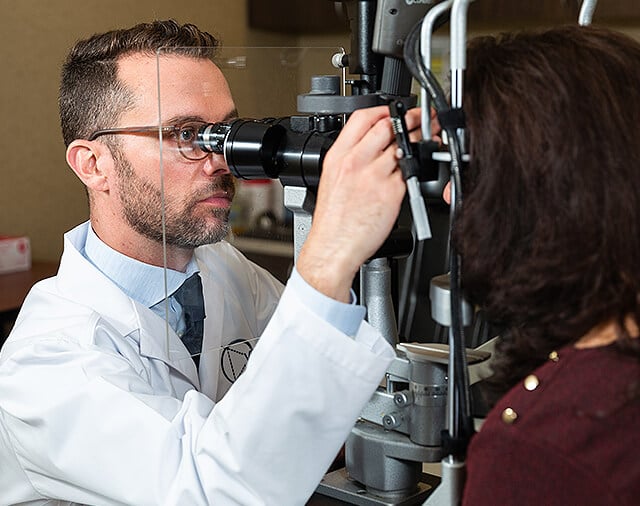Retinal Tears and Detachments

As we age, taking care of our eye health becomes more critical. After all, they provide a window to observe the world around us.
But what happens when we suddenly start getting floaters and flashes? Can it signify a greater problem we must treat immediately?
This blog post will inform you about retinal tears and detachments: their causes, the diagnosis process, and the treatment options. Stay with us to learn more.
What Is the Retina, and What Is Its Function?
The retina is the membranous organ in the back of the eye that senses light, converts it into an electrical signal, and sends it to your brain. Without the retina, we can't see anything. A common analogy to describe the retina is "the film In the camera."
The Retina fills the entire back portion of the eye, and the rest is filled with a gel needed for fetal development. But after birth, this gel turns into something that sometimes causes problems for the eye.
Vitreous Risk Factors
We are all born with a gelatinous material inside our eyes called the vitreous. As we age, this gel thins and can move around. When this replacement happens, we get symptoms called floaters. If these happen quickly, we may get flashes of light.
Flashes and floaters are symptoms that start suddenly. They don't need specific events to take place to occur, but this is a sign that your vitreous gel is quickly shifting inside your eye, which may cause vitreous detachment.
The tear in your retina caused by the vitreous gel is called a retinal tear. If water goes through that tear, it may lift the retina and cause retinal detachments.
What Causes Retinal Tears and Detachments?
After a certain age, the jelly that was nice and firm when we were born starts to break down. In time, this breaking-down process may cause retinal tears and detachment.
Retinal Tears and Detachment Checkups
If you get your eye examination and do not have any retinal tear or detachment, you will be advised to follow up with your doctor 6 to 8 weeks after your first check-up to ensure you haven't developed a tear in the interim.
Retinal Detachment Treatment
Patients diagnosed with a new retinal tear are advised to seek treatment immediately. Treatment usually takes around five minutes and is conducted as a procedure in your doctor's office.
Treatment for These Eye Conditions
Retinal tears, specifically a new tear, are treated immediately in two different ways, right in our offices:
- Laser treatment.
- Cryotherapy (a freezing treatment that removes abnormal tissue).
Laser treatment can be offered to patients who don't have any hemorrhaging while those who do can be treated more safely with cryotherapy. These treatments do the same as they both seal down the retinal detachment.
If a patient starts losing peripheral vision, this might be an indication that they have a retinal detachment. The traction can affect the central vision if it is large enough.
Warning Signs
If you suddenly start to see floaters or flashes, it's highly recommended that you see an eye specialist immediately. Most floaters and flashes you experience may not be signs of a tear or a detached retina. However, if you miss the symptoms and don't get treated in time, you can have a significantly bigger problem to deal with later.
When a retinal tear causes vision loss or a more severe condition, it's crucial to watch out for detachment symptoms, which can be listed as follows:
- New, on-set floaters.
- Flashing lights, especially in the dark.
- Haziness or smokiness in your vision.
- Loss of peripheral vision.
Surgery
If you are diagnosed with retinal detachment, your doctor will probably advise you to have surgery at a hospital or a surgical facility. This advice will direct you to either have a vitrectomy, a scleral buckle, or a combination of both procedures as your surgical treatment.
Patients can leave the hospital or surgical facility on the same day.
Important Notes
- Retinal detachment surgery is typically successful in restoring vision. Still, about three percent of patients who have retinal detachment surgery report experiencing another detachment within one to three months of their surgery and require additional surgery.
- It is estimated that 70 to 90 percent of people who undergo vitrectomy surgery develop a cataract within the first year of their surgery. Patients who have previously undergone a cataract surgery won't develop it a second time, but those who have never had it before vitrectomy are highly susceptible to doing so.
- If you're showcasing symptoms, immediately prevent retinal detachment from worsening by contacting an eye specialist. Proper and professional care can be life-changing.


